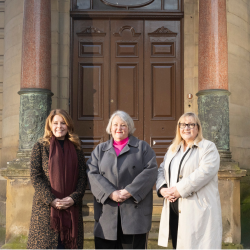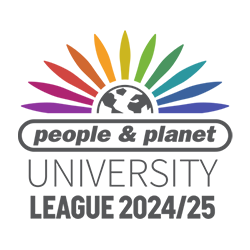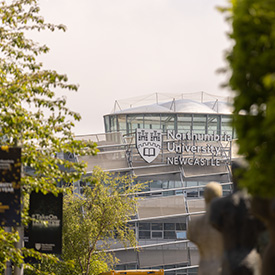-
Study
-
Undergraduate
- Search for a Course
- Undergraduate Open Day & Events
- Application Guides
- Northumbria University UCAS Exhibitions
- Foundation Years
- Undergraduate Fees & Funding
- School & College Outreach
- Continuing Professional Development
-
Postgraduate
- Postgraduate Study Degree
- Postgraduate Research Degrees
- Postgraduate Open Days and Events
- Postgraduate Fees & Funding
- Flexible Learning
- Thinking about a Masters?
- Continuing Professional Development
- Change Direction
-
Student Life
- The Hub - Student Blog
- Accommodation
- Life in Newcastle
- Support for Students
- Careers
- Information for Parents
- Students' Union
- Northumbria Sport
- Be Part of It
-
-
International
International
Northumbria’s global footprint touches every continent across the world, through our global partnerships across 17 institutions in 10 countries, to our 277,000 strong alumni community and 150 recruitment partners – we prepare our students for the challenges of tomorrow. Discover more about how to join Northumbria’s global family or our partnerships.
View our Global Footprint-
Applying to Northumbria
- European Union
- Our London Campus
- Northumbria Pathway
- International Events
- Entry Requirement and Education Country Agents
- Global Offices
-
Northumbria Language Centre
- Faculty Requirements
- Acceptable English Requirements
- Pre-sessional English Language and Study Skills
- Academic Language Skills Programmes (ALS)
-
International Fees, Funding & Scholarships
- International Undergraduate Fees
- International Undergraduate Funding
- International Masters Fees
- International Masters Funding
- International Postgraduate Research Fees
- International Postgraduate Research Funding
- International Money Matters
-
Life at Northumbria
- International student support
- Careers
-
International Mobility
- Current Northumbria Students
- Incoming Exchange Students
-
-
Business
Business
The world is changing faster than ever before. The future is there to be won by organisations who find ways to turn today's possibilities into tomorrows competitive edge. In a connected world, collaboration can be the key to success.
More on our Business Services -
Research
Research
Northumbria is a research-rich, business-focused, professional university with a global reputation for academic quality. We conduct ground-breaking research that is responsive to the science & technology, health & well being, economic and social and arts & cultural needs for the communities
Discover more about our Research -
About Us
-
About Northumbria
- Our Strategy
- Our Staff
- Place and Partnerships
- Student Profiles
- Alumni Profiles
- Leadership & Governance
- Academic Departments
- University Services
- History of Northumbria
- Contact us
- Online Shop
-
-
Alumni
Alumni
Northumbria University is renowned for the calibre of its business-ready graduates. Our alumni network has over 246,000 graduates based in 178 countries worldwide in a range of sectors, our alumni are making a real impact on the world.
Our Alumni - Work For Us
What will I learn on this module?
This module will introduce you to the study of musical instruments, known as organology, and examines their use, construction, and position within society. As the principal voices of music, musical instruments serve as vehicles for composers’ ideas. However, the instruments are more than just tools of performance, allowing us to observe a variety of cultural facets, such as our sociocultural history, from a unique angle. Their importance has woven them into our wider cultural backdrop, featuring in literature and iconographical sources, and many musical instruments are works of art in their own right. These interconnections across the humanities prove that the instruments are about more than just the music that they perform.
Through the lens of musical instruments, the lectures will address topics such as gender, sexuality, social class, and race, shedding light on the evolution of society over the course of approximately 500 years. The module will address current, historical, and world instruments to provide you with a broad understanding and appreciation of different musical cultures and the intersections that occur between the traditions. You will therefore be introduced to research skills that utilise materials beyond contemporary books and journals, while also developing an understanding of organological theories and methodologies that can be assimilated into your own performance studies.
How will I learn on this module?
Your learning will be divided between one-hour lectures, and one-and-a-half hour seminars each week. The lectures will address the historical context of the instruments under examination, providing you with a solid foundational understanding of the instrument, its characteristics, use and position within society. The content of the seminars will vary each week, but will mainly unpack the content of the lectures and encourage you to engage in dialogue with your peers. Other activities may include short presentations (solo and group), group work, debates, and hands-on instrument examinations. Your assignments will be supported by group tutorials spread throughout the semester.
How will I be supported academically on this module?
Your academic development will be supported through the module tutor, engagement with your peers and through your programme leader. Your module tutor will offer tutorials, both for the preparation of your assignments and for feedback. In addition, you will also be able to see the module tutor (for instance in the publicised feedback and consultation hours) and to raise questions via email. Your peers will provide you with a collaborative learning environment, and your programme leader will guide you through the requirements and expectations of your course. You will also be supported through individual engagement with the academic literature, lectures, and resources available on the eLearning Portal. Feedback will be ongoing throughout seminar activities and through assessment tasks.
What will I be expected to read on this module?
All modules at Northumbria include a range of reading materials that students are expected to engage with. Online reading lists (provided after enrolment) give you access to your reading material for your modules. The Library works in partnership with your module tutors to ensure you have access to the material that you need.
What will I be expected to achieve?
Knowledge & Understanding:
• You will demonstrate an advanced understanding of key musical instruments and their families, and of the historical contexts that impacted the instruments under observation.
Intellectual / Professional skills & abilities:
• You will be able to identify,utilise and critique a range of primary and secondary sources beyond books, journals and scores, such as iconography, audio recordings and musical instruments.
• You will develop your oral presentation skills through both formative and summative assessment
Personal Values Attributes (Global / Cultural awareness, Ethics, Curiosity) (PVA):
• You will develop your understanding of issues of gender, sexuality, social class and race within the context of music history.
- You will demonstrate a curiosity about the role of musical instruments as pieces of material culture, considering both the whole instrument and the complexities of their component parts.
How will I be assessed?
1. Oral Presentation of 20 minutes + questions (40%). MLOs: 1, 2, 3, 4
2. Essay of 3,000 words (60%). MLOs: 1, 2, 3, 4
Pre-requisite(s)
N/A
Co-requisite(s)
Students may take EITHER the level 5 (MU5006) OR the level 6 (MU6009) version of this module in their degree, but not both. N/A
Module abstract
This module will introduce you to the study of musical instruments, known as organology, and examines their use, construction, and position within society. In the West, instruments serve an important function in bringing music to life from written composer’s score to aural phenomenon. They also can tell us a great deal about sociocultural history, and relate to issues of gender, sexuality, social class and race. Instruments feature in literature and iconographical sources, many being works of art in their own right. You will gain an understanding of how material culture plays a part in musicological enquiry, and create links between instruments, scores and performance practice. You will look at current, historical and world instruments across a range of cultures.
Course info
UCAS Code W320
Credits 20
Level of Study Undergraduate
Mode of Study 3 years Full Time or 4 years with a placement (sandwich)/study abroad
Department Humanities
Location City Campus, Northumbria University
City Newcastle
Start September 2025
All information is accurate at the time of sharing.
Full time Courses are primarily delivered via on-campus face to face learning but could include elements of online learning. Most courses run as planned and as promoted on our website and via our marketing materials, but if there are any substantial changes (as determined by the Competition and Markets Authority) to a course or there is the potential that course may be withdrawn, we will notify all affected applicants as soon as possible with advice and guidance regarding their options. It is also important to be aware that optional modules listed on course pages may be subject to change depending on uptake numbers each year.
Contact time is subject to increase or decrease in line with possible restrictions imposed by the government or the University in the interest of maintaining the health and safety and wellbeing of students, staff, and visitors if this is deemed necessary in future.
Useful Links
Find out about our distinctive approach at
www.northumbria.ac.uk/exp
Admissions Terms and Conditions
northumbria.ac.uk/terms
Fees and Funding
northumbria.ac.uk/fees
Admissions Policy
northumbria.ac.uk/adpolicy
Admissions Complaints Policy
northumbria.ac.uk/complaints














